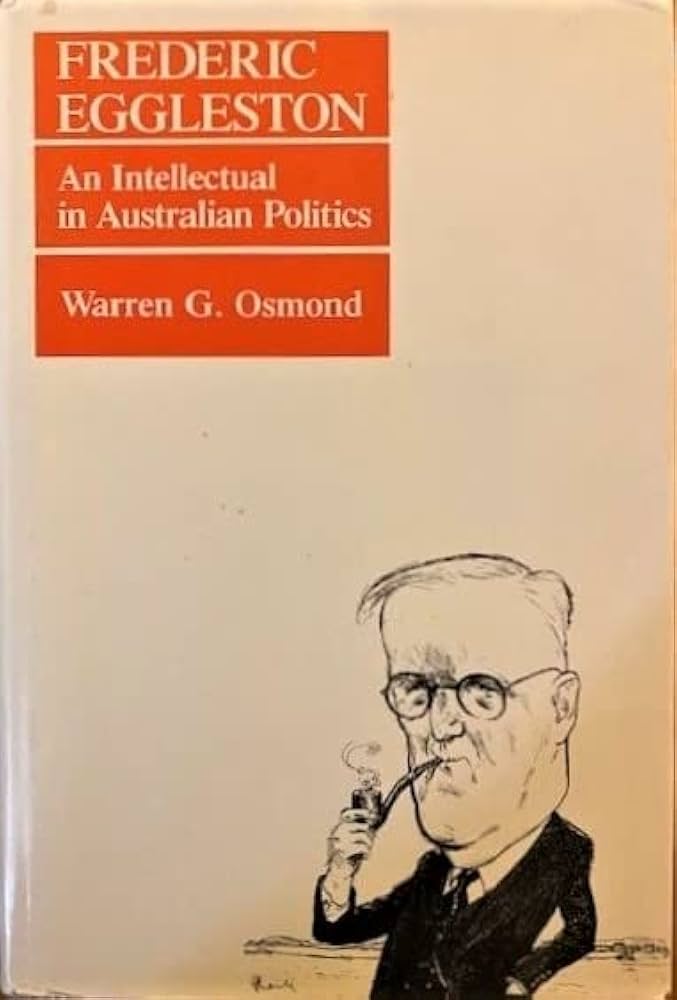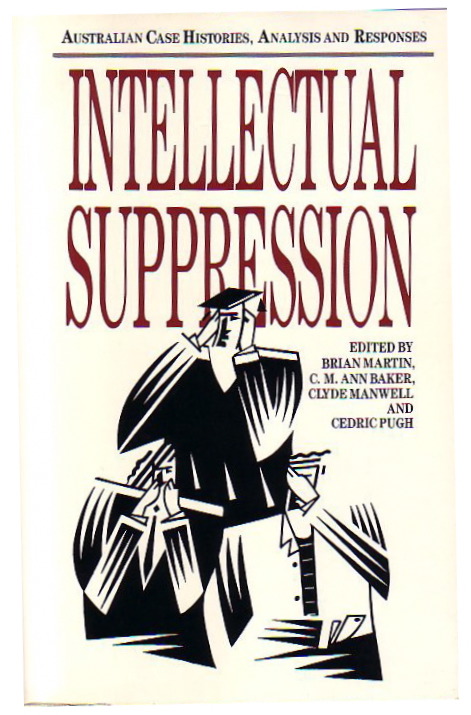- Free Article: No
- Contents Category: Biography
- Custom Article Title: An Exceptional Biography: And an over-networked situation
- Review Article: Yes
- Article Title: An Exceptional Biography
- Article Subtitle: And an over-networked situation
- Online Only: No
- Custom Highlight Text:
Here are two books which illuminate aspects of intellectual life in Australia. The anthology edited by Brian Martin et al documents numerous instances of ‘intellectual suppression’, cases where individual scholars find their careers in jeopardy because their findings offend the powerful.
- Book 1 Title: Frederic Eggleston
- Book 1 Subtitle: An intellectual in Australian politics
- Book 1 Biblio: Allen & Unwin, $29.95 hb, 357 pp
- Book 1 Cover Small (400 x 600):

- Book 1 Cover (800 x 1200):

- Book 2 Title: Intellectual Suppression
- Book 2 Biblio: Angus & Robertson, $19.95 pb, 300 pp
- Book 2 Cover Small (400 x 600):

- Book 2 Cover (800 x 1200):

Intellectual life is densely textured, with personal friendships, ideological alliances and disciplinary allegiances all overlapping and creating crises of loyalty, hot-house rivalries, and other symptoms of an ‘over-networked’ situation. These problems are even more acute in a small well-educated country like Australia. In other countries different cities or institutions foster their own intellectual traditions, nurturing regional cultures which protect their own. The Melbourne – Sydney rivalry expresses this in embryonic form. The cynics believe that a form of intellectual herpes explains most debate in Australia’s South East corner.
Warren Osmond’s biography of Frederic Eggleston adds a great deal to our understanding of the intellectual’s role in Australian politics and culture, and returns to this point about networks many times. In one aside, Eggleston was sincerely astonished by the role of personal friendship in Australian academic life:
I have had a very wide and intensive experience of life – in the law, in politics, in government, as a member of important commissions and also in diplomacy. In all these various phases of my career, personal considerations have been most important, but I have never been able to choose my clients, my fellow ministers, my fellow commissioners, my diplomatic posts or my cher colleagues. I have worked with men who I have criticised and who have bitterly opposed me, and I have enjoyed the experience. One would think that, in University matters, the intellectual interests of the tasks in hand and the responsibilities involved would reduce the importance of personal considerations. (p.272)
This comment arose out of Eggleston’s involvement in the formation of the ANU, and Keith Hancock’s role in particular. This section of the biography throws new light on the men who were the national university’s midwives.
By this time (1949) Eggleston was near the end of a distinguished if chequered career. Osmond’s biography is all the more impressive for having to follow his subject’s many twists and turns, both intellectually and personally. Born in 1875 to Methodist parents, Eggleston was a suburban solicitor who first showed his intellectual promise in two unpublished papers written in 1895. He married the vivacious Lulu Henriques (their courtship letters survive) and became part of the Boobooks circle.
After being mayor of Caulfield, Eggleston spent the Kaiser’s War stationed on Salisbury Plains, and, despite his affection for them, found absolutely no hospitality from the English. He landed om his feet momentarily with a job at the Paris Peace Conference, and then was elected to the Victorian parliament in the 1920s, and became Chairman of the new Commonwealth Grants Commission in 1933. In 1941 he was appointed our first ambassador to China, and in 1945 joined Australia’s delegation at San Francisco. His postwar assignments included the tuition of professional diplomatic trainees, the creation of the ANU, and the completion of several works of social theory.
It was this interest in social theory which got Osmond interested in Eggleston in the first place, as Eggleston was arguably the only indigenous theorist produced in Australia during those years. The power of this biography derives from its extraordinarily disciplined treatment of Eggleston’s psychology, social place, intellectual development and political experience. It is without doubt the best biography published in Australia in recent times.
At the broadest level it explores the position of the unattached intellectual in Australian life. It amplifies and extends points made in the Brian Martin anthology. Because Eggleston was never prepared to become an intellectual neuter he was kept on the margins of political power all through the 1930s and 1940s. Even when he had claims to eminence he had trouble getting his work published.
The Brian Martin anthology tends to individualise the undoubtedly chronic suppression suffered by many intellectuals in Australia. It does not very much advance our understanding of why intellectuals pursue the truths they do, why they run into trouble, and how they fight on.
Eggleston’s role as an unattached intellectual was a significant as that of the man who was born thirty years after him, Brian Fitzpatrick. Warren Osmond has revivified a great Australian intellectual who came to maturity just at that moment when organised labour made its entry into national politics. Eggleston was a new breed of intellectual, the bearer of Deakinite liberalism who wished to defend the indigenous sense of social justice, devise methods of workable governmental intervention, and identify a ‘pattern’ in Australian social life. He was thus squarely within that ‘Australian liberalism’ analysed by Tim Rowse in 1978 which continues to inform key sections of both major political parties. Osmond’s biography fills the silences and lacunae in the life of a key Australian intellectual.


Comments powered by CComment